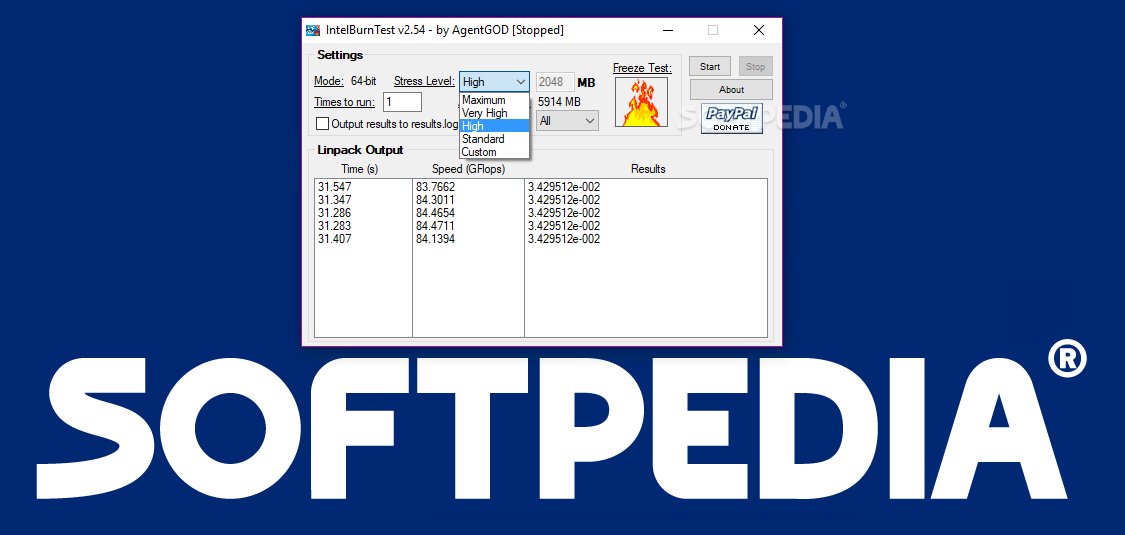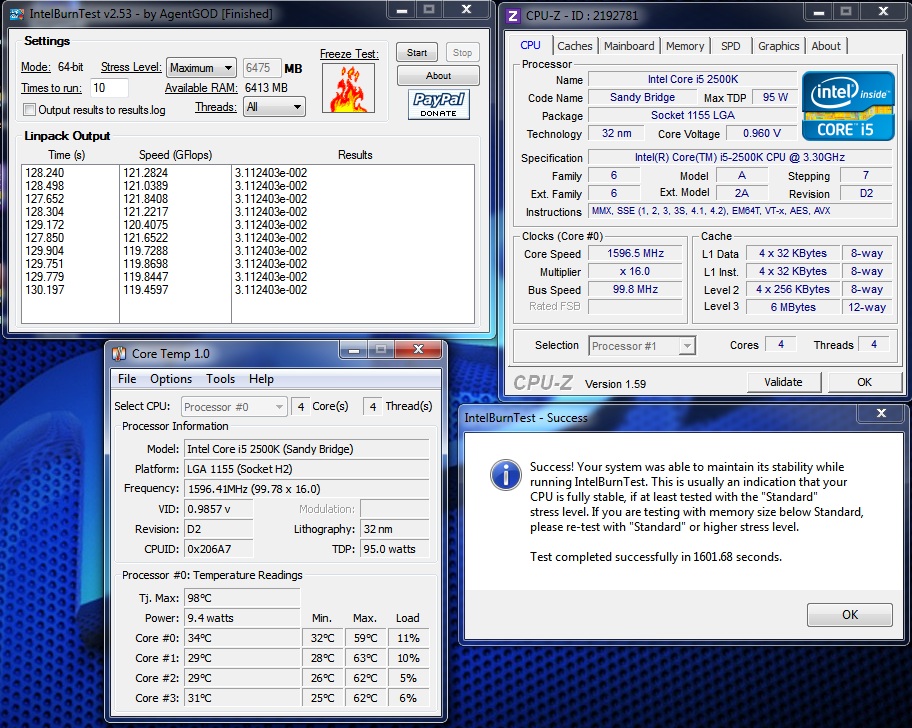

- #INTEL BURN TEST STRESS LEVEL SOFTWARE#
- #INTEL BURN TEST STRESS LEVEL PC#
- #INTEL BURN TEST STRESS LEVEL WINDOWS#
You can fry your components if a worst-case scenario occurs and you’re not paying attention. While many components will automatically shut down if they overheat, not all will, and you want to pull the plug on your testing if your hardware hits dangerous heat levels. You’ll want to have at least one of the two programs open during stress tests.

SpeedFan does the same, though its interface isn’t quite as polished as HWMonitor’s.
#INTEL BURN TEST STRESS LEVEL SOFTWARE#
CPUID’s HWMonitor software does exactly that, providing you with a real-time glimpse of your components’ temperatures, voltage, and fan speeds. Before you start torturing your PC, you’re going to need a way to keep tabs on its screaming. Laying the groundwork Here’s a look at HWMonitor and SpeedFan’s interfaces side-by-side.Īctually, it isn’t. Ladies and gentlemen, it’s time to start your engines. If a graphics card or overclocked CPU consistently overheats and shuts down during a stress test, it’s time to dump the stock cooler, add a few case fans, and possibly even consider liquid cooling.Īll that said, the actual process of stress testing isn’t terribly complicated, though it can be time-consuming. Running stress tests can also let you know if you need additional cooling in your computer. It’s best to uncover unstable components sooner rather than later, while they’re still under warranty. Stress-testing software places your components under an intense workload to simulate a worse-case scenario if a component crashes, hangs, or otherwise fails a dedicated stress test, there’s a good chance that it won’t be reliable under a heavy everyday load. Even if a computer boots up and performs well under normal usage, fickle hardware can cause woes when you step up to heftier tasks, such as gaming or video editing. Why stress-test? Simple: To ensure the reliability and stability of your system. Let’s make this processor squirm, shall we? Whenever you buy or build a PC, swap out a major component, or overclock a piece of hardware, it’s a good idea to stress-test (or “burn in”) the fresh gear, which is not the same as benchmarking your rig.
#INTEL BURN TEST STRESS LEVEL PC#
Thankfully, the hot and heavy world of stress testing can help to identify critical faults before your PC craps out in the middle of a critical operation. Equipment failures still happen, however rarely, and even the beefiest of computer components aren’t worth their weight in silicon if they aren’t dependable. If you want to bench the system get PCMark 7 which tests everything on your rig, or the 3DMark Vantage which is used by gamers to test CPU and GPU for gaming.Īs far as GFlops and the P67/Z58 Chip Set I can't really help you.Modern-day PCs are more reliable than ever before, but that doesn’t mean they’re infallible.

No one here takes it seriuosly as I have seen more scores fluctuate from not even changing anything. WEI is garbage and should not even be considered a benchmark. Part of the problem MAY be because i can't run my Ram cards in dual channel, i think i may have a bad board, cant RMA it till i fix my laptop other wise im stuck without a computer for a while I gotta do more research on gflops cause i don't know what that is lulz I currently have it stable 4.5GHz with VCore 1.40v & VTT 1.20vīut i am still getting 105 gflops, not sure what its supposed to be at My processor and ram used to score 7.7 each, now they dropped to 7.6 each, not a big difference, but overclocking is supposed to increase performance not reduce it lulz
#INTEL BURN TEST STRESS LEVEL WINDOWS#
Yeah i have notice a performance decrease on running Windows Experience Index Notice how the clock speeds are shown to be at the normal speeds rather then the overclocked speeds? or turbo boost speeds? i forgot what voltages i used for the CPU Vcore on either overclock, but they both are different. This one was ran with my CPU Overclocked 4.4GHz Processor: Intel(R) Core(TM) i5-2500K CPU 3.30GHz This one was run with my CPU Overclocked 4.0GHz Intel i5 2500k 3.3ghz (3.7ghz Turbo Boost)


 0 kommentar(er)
0 kommentar(er)
